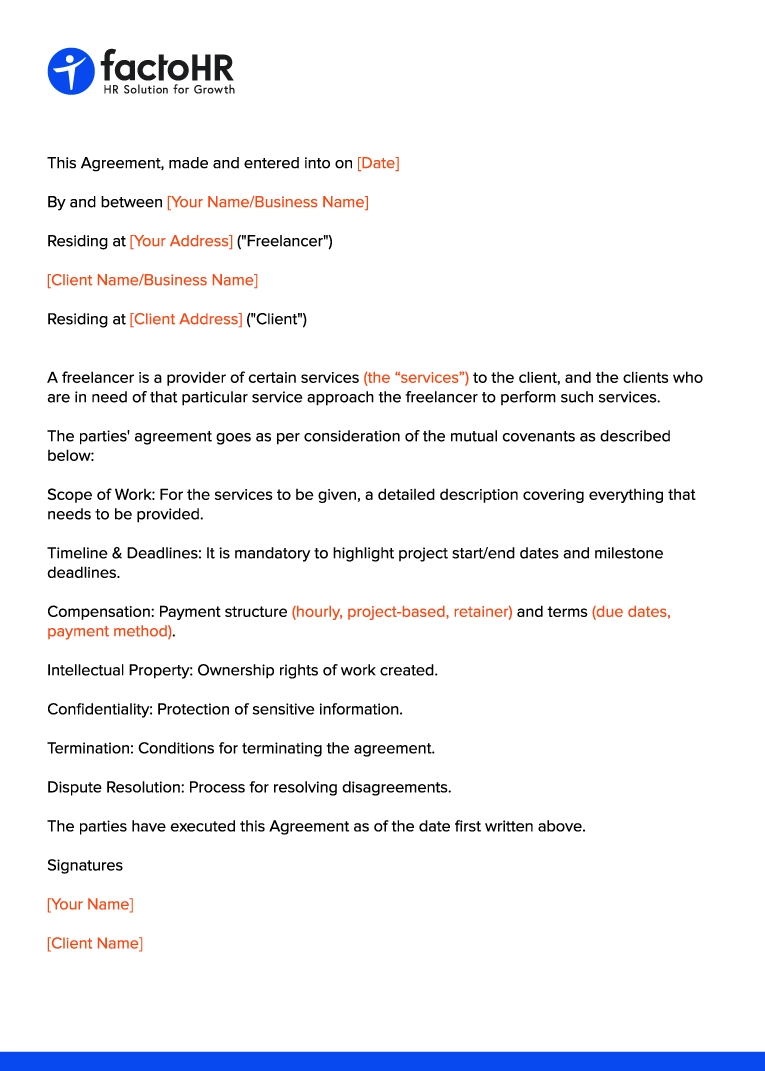Freelance Agreement Template for 2025

Table of Contents
The freelance economy thrives, attracting more talent due to its flexibility across various skills. However, this flexibility requires responsibility. A well-crafted freelance agreement is crucial for clients and freelancers to ensure a smooth project experience. It sets clear expectations, addresses potential issues, and enables both parties to work towards a successful outcome. If you’d like to learn more, check out this comprehensive blog on the importance of a freelance worker contract and tips for creating an effective one.
What is a Freelance Agreement?
A freelance agreement is more than a formality. It’s a legal document that protects both you and your freelancers and ensures a smooth and secure project experience.
Freelance Contract Template


Essential Elements of a Freelancer Contract
Parties Involved
Your Legal Name
Your legitimate name should be used as it appears on your tax documents.
Freelancer’s Legal Name
Ensure you get freelancers’ names on paper to ease the paperwork.
Contact Information
Personal details like email addresses, phone numbers, and physical addresses must be included.
These pieces of information should be on hand whenever required.
Scope of Work
This is the heart of your agreement. It defines the project in detail, including:
Deliverables
Clearly outline the final product or service. List the number of pages, functionalities, and design elements for a website project.
Milestones
Break down the project into more miniature, achievable stages with deadlines for each. This establishes a clear roadmap for progress.
Revision Process
Define the number of revisions included in the fee. Specify how revision requests should be submitted and turnaround times. This manages expectations and prevents endless revisions.
Changes to Scope
Anticipate potential changes. Outline the process for handling additional requests beyond the initial scope. This could involve renegotiating fees and deadlines to compensate both parties fairly.
Timeline and Deadlines
Project Start and End Date
Define the overall timeframe for the project.
Milestone Deadlines
Set specific due dates for each milestone within the project.
Late Delivery Penalties
Consider including a clause outlining potential consequences for either party’s late delivery (e.g., late fees).
Compensation
Hourly Rate
Ensure clear documentation of the freelancer’s hourly rate and the method for tracking hours. This is ideal for variable workflows.
Project-Based Fee
Priorly decided fees that suggest how they will be paid for the entire project should be clearly defined.
Payment Terms
Outline the specifics of how the freelancer will be paid:
Due Dates
Specify when payment is due for each invoice.
Late Fees
Include a clause outlining late payment penalties (e.g., interest on overdue invoices).
Payment Methods
Define acceptable payment methods (e.g., bank transfer, online payment platform).
Intellectual Property Rights (IPR)
Ownership of Work
Clearly define who owns the work’s copyright. Once payment is made, the client (employer) will typically own the copyright.
Pre-Existing Work
If the freelancer plans to use pre-existing work (e.g., stock photos, fonts), ensure they have the necessary licenses and outline any usage limitations.
Confidentiality
Confidential Information
List things you think must be kept private that could create problems in case they leak (e.g., client data, project details, trade secrets).
Non-Disclosure Obligations
Written consent is required if confidential information is disclosed, as both parties are obligated not to disclose it.
Termination
Termination for Cause
Acknowledge termination reasons, whether missed deadlines, non-payment, or breach of contract.
Termination Without Cause
Include a clause allowing either party to terminate with written notice (e.g., 30 days).
Payment Upon Termination
Define how completed work will be compensated in case of termination.
Dispute Resolution
When disagreements arise, an impartial mediator can help both parties resolve the dispute, avoiding costly legal battles.
Conclusion
A freelance agreement will allow a smooth workflow and guarantee everyone’s interest is fulfilled. It is more than just a formality; ensuring that the outlined elements are met to the fullest extent is a win-win situation for both parties. A successful collaboration is a long-lasting collaboration. By following a well-crafted flow, the freelance world becomes more empowered.

Frequently Asked Questions
Is a Contract Necessary for Freelancing?
A freelance contract benefits both you and your freelancer. It ensures that the work is done according to your requirements and prevents misunderstandings.
What if the Project Is Small and Simple?
It is better to draft a reliable long-term agreement that prevents late payments or scope creep.
Is it Okay to Use a Freelance Agreement Template?
A suitable freelance contract template can be beneficial. Customizing the template according to your project requirements is essential. Consulting a lawyer is advised, especially for complex projects.
Should I Get a Lawyer to Review My Agreement?
Not every project requires a lawyer to intervene in specific clauses, but for complex projects, they become essential. They make sure your agreement protects your interests.

Modernize your HR tasks with factoHR today
Experience the digitalization of everyday business activities with factoHR's modern and compatible solutions for every need.

© 2024 Copyright factoHR

